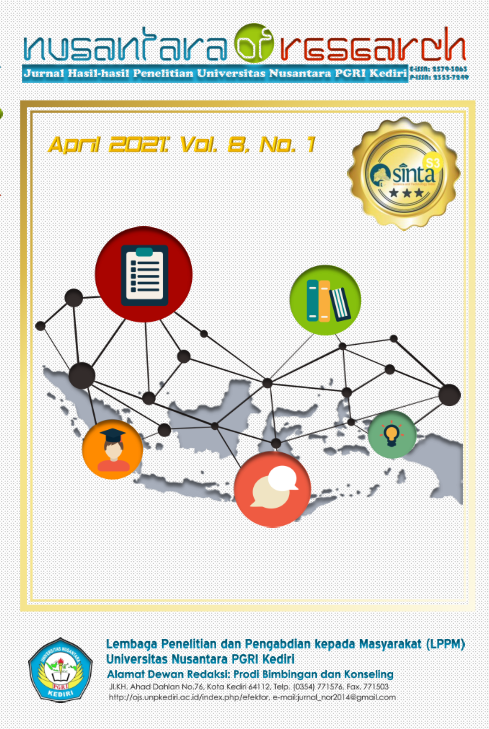Validity and Reliability of Self-discipline Scale for Junior High School Students
Main Article Content
Abstract
Self-discipline is one of the characters that must be mastered by students. Individuals who have self-discipline will easily organize, direct, and control everything they do to achieve the desired goals. Conversely, individuals who lack self-discipline will have an impact on students' academic problems. To be able to find out how much self-discipline each individual has, an instrument in the form of a psychological scale of self-discipline is needed. Through this self-discipline scale it is expected to map how high the level of self-discipline of junior high school students is. This study aims to determine the validity and reliability of junior high school students' self-discipline scale. The development of a self-discipline scale uses the steps of arranging an instrument from Riduwan (2013: 32) which consists of six steps. Based on calculations using product moment correlation and alpha cronbach, it was found that 61 items were valid with a reliability of 0.949. This shows in the very high category. It is hoped that BK teachers can use this scale to map the level of self-discipline of junior high school students who are in the high, medium, and low categories.
Downloads
Article Details
Issue
Section
Authors who publish with this journal agree to the following terms:
- Copyright on any article is retained by the author(s).
- The author grants the journal, the right of first publication with the work simultaneously licensed under a Creative Commons Attribution License that allows others to share the work with an acknowledgment of the work’s authorship and initial publication in this journal.
- Authors are able to enter into separate, additional contractual arrangements for the non-exclusive distribution of the journal’s published version of the work (e.g., post it to an institutional repository or publish it in a book), with an acknowledgment of its initial publication in this journal.
- Authors are permitted and encouraged to post their work online (e.g., in institutional repositories or on their website) prior to and during the submission process, as it can lead to productive exchanges, as well as earlier and greater citation of published work.
- The article and any associated published material is distributed under the Creative Commons Attribution-ShareAlike 4.0 International License
How to Cite
References
Arofah, L. 2017. Pentingnya Siswa Memiliki Self Discipline Sebagai Alternatif Penguatan Karakter. Seminar Nasional Peran Bimbingan dan Konseling dalam Penguatan Pendidikan Karakter. Jogjakarta: Universitas Ahmad Dahlan.
Azwar, S. 2000. Reliabilitas dan Validitas. Yogyakarta: Pustaka Pelajar.
Brooks, R. & Goldstein, S. 2008. Raising A Self-Disciplined Child. United States: Mc Graw Hill.
Bryant, T. 2011. Self Discipline in 10 days: How to Go from Thinking to Doing. Seattle, Washington: Human Understanding and Behavior Publishing.
Duckworth, A.L., & Seligman, M.E.P. 2005. Self-Discipline Outdoes IQ in Predicting Academic Performance of Adolescents. Psychological Science, 16 (12): 939-944.
Elstad, E. 2008. Building self-discipline to promote learning: students’ volitional strategies to navigate the demands of schooling. Springer Science + Business Media.
Etzioni, A. 1982. The Role of Self-Discipline. _: Phi Delta Kappa International.
Fauzan, L. 2013. Self Discipline Siswa Sebagai Masalah dalam Bimbingan dan Konseling: Gambaran dan Model Bantuannya. Jurnal Kajian Teori dan Praktik Kependidikan, 1 (40): 16-23.
Gorbunovs, A., Kapenieks, A., & Cakula, S. 2016. Self-discipline as a key indicator to improve learning outcomes in e-learning environment. Procedia-Social and Behavioral Sciences, 231: 256-262.
Manandar, T., & Shrestha, P. 2019. A Study on Relationship between Self-Discipline and Study Habits among Nursing Students at Bhaktapur, Nepal. International Journal of Health Sciences Research, Vol 9 (5): 242-248.
Matondang, Z 2009. Validitas dan Reliabilitas Suatu Instrumen Penelitian. Jurnal Tabularasa PPS UNIMED, 6(1): 87-97.
Papalia, D.E., Olds, S.W., & Feldman, R.D. 2009. Perkembangan Manusia. Jakarta: Salemba Humanika.
Pearman, A. & Storandt, M. 2005. Self-Discipline and Self-Consciousness Predict Subjective Memory in Older Adults. Journal of Gerontology: PSYCHOLOGICAL SCIENCES, Vol 60B (3): 153-157.
Riduwan. Skala Pengukuran Variabel-variabel Penelitian. Bandung: ALFABETA.
Sutrisno, H. 2009. Kasus Perilaku Pelanggaran Disiplin Siswa Di Sekolah Ditinjau Dari Kerangka Teori Sosiologi Fungsionalisme. Jurnal Pendidikan Inovatif, 4 (2): 60-66.
Yusup, F. 2018. Uji Validitas Dan Reliabilitas Instrumen Penelitian Kuantitatif. Jurnal Tarbiyah: Jurnal Ilmiah Kependidikan, 7 (1): 17-23.




